
The homeowners’ insurance claims process often comes with extra stress and uncertainty. Filing a claim with your insurance company means you’ve suffered an unexpected loss or damage to your home, and getting your life back to normal is your number one priority and our priority too.
How to file a home insurance claim
Knowing what to expect and having a plan when filing a home insurance claim can relieve some of the hassle and uncertainty. Here’s a handy checklist of what to do and what to expect when filing a homeowners insurance claim.
The homeowners claim filing checklist is your to-do list to help you through the claims process.
Claims Reporting Checklist
Contact your insurance agent to report your claim. They will help guide you through the process and help you understand what to expect.
REPORT
- Think safety first – contact police or emergency personnel if there are any injuries or a crime.
- Call your insurance agent or insurance company.
- Have the name of the policyholder and policy number available when you call.
- Provide details and facts related to the damages and loss.
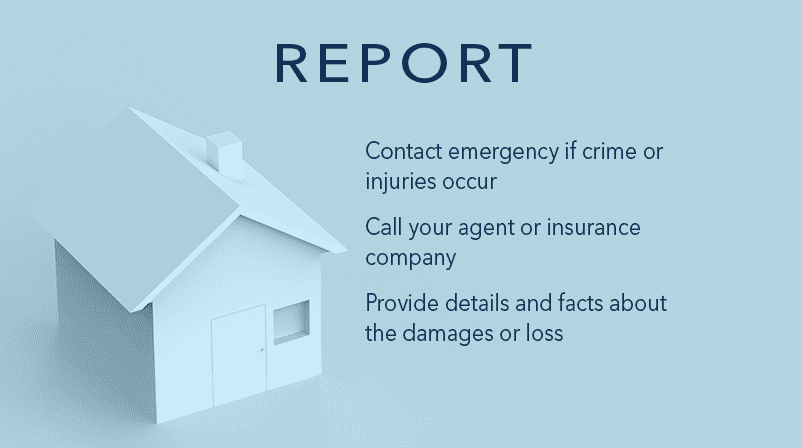
RECORD
- Be sure to write down the claims number you are assigned.
- Get the name and contact information of the Claims Handler or Adjuster that is assigned to your case.
- Feel free to ask for written confirmation (email will do) about the details of the conversations with your insurance agent or claims adjuster.
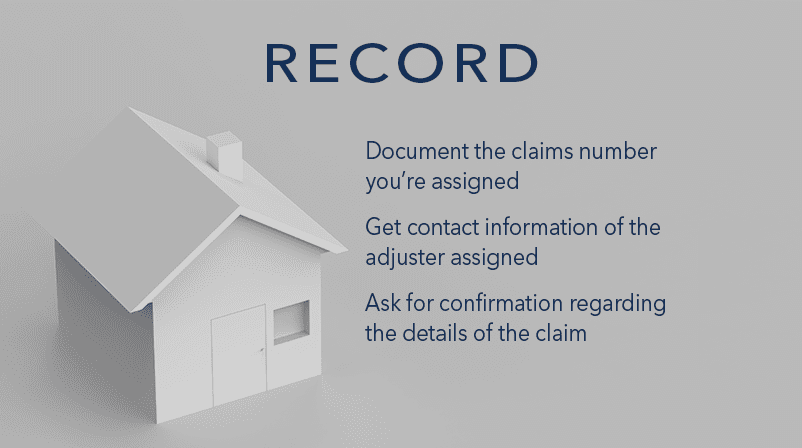
PROTECT
- Protect damaged areas.
- Provide a secure and safe zone around the damaged area.
- Check for safety, such as structural integrity and electrical safety.
- Make temporary repairs to prevent further damage.
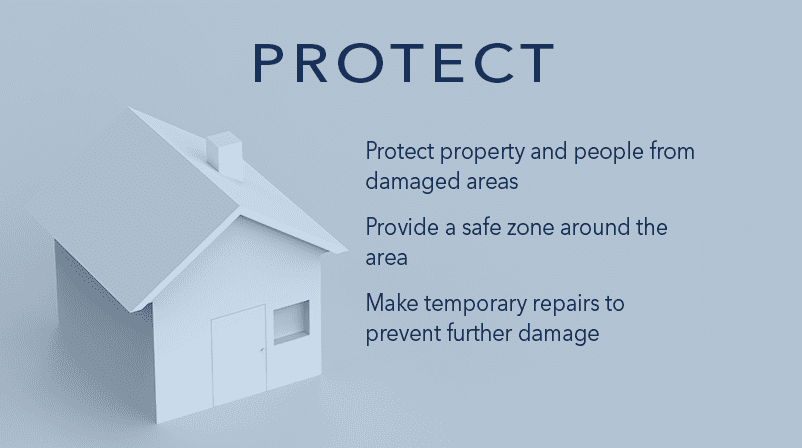
DOCUMENT
- Make a list of damages so that you will not forget items you want to discuss with the insurance adjuster.
- Use home inventory records for damaged items.
- Take photos or video of the damages.
- Keep all damaged items until after the insurance adjuster has made their inspection.
- Get estimates and quotes for repairs.
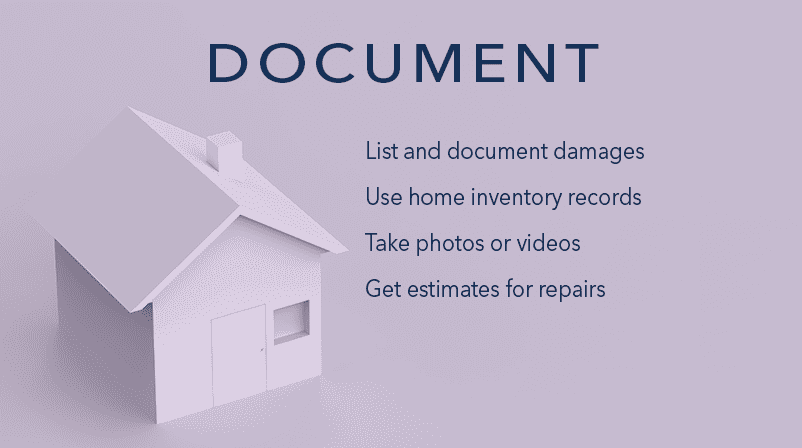
TRACK
- Establish a timeline with your insurance agent or claims handler for repairs.
- Keep a folder with all records, receipts, and documentation.
- Maintain contact with your insurance agent or claims handler for updates on the progress of your claim.
- Ask your Claims Adjuster if there’s a way to track your claim online.
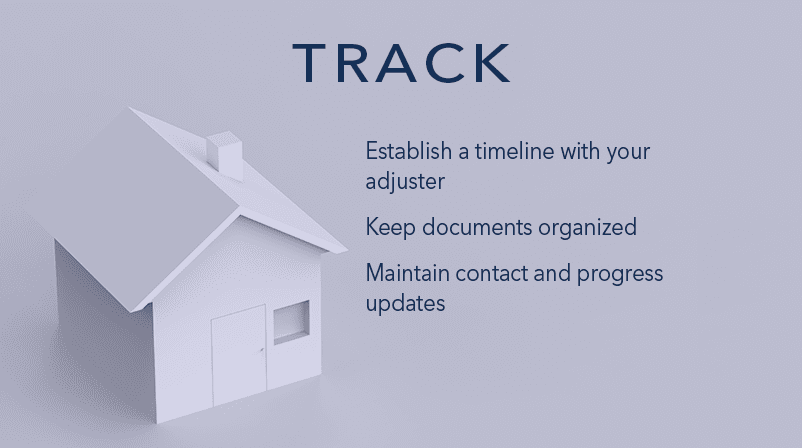
Communication is an essential aspect of filing a claim. You can depend on your local independent insurance agent to listen, help you stay informed, and guide you through the claims process. At Colby Insurance Group, we’re here to listen and understand your unique claims situation and to be your advocate to ensure your claim is handled efficiently and appropriately by your insurance provider.
How long does a home insurance quote take?
The time it takes to get paid for an insurance claim depends on several factors and can take anywhere from a few days to a few weeks or even a little over a month. One main determining factor is which state you file your claim in. After a claim is accepted, each state, by law, must pay a claim within a determined amount of time according to state law. For example, once a claim is accepted, the State of New Hampshire has five days to pay the claim, and the State of Vermont has ten days to pay the claim.
The process of accepting the final terms of the claim has several steps. Once a claim is filed, the company will review the claim.
Home insurance claim process
The following steps are part of the claims review process. The steps may vary depending on the claim.
- You’ll be assigned a claims number and a claims adjuster.
- Gather data, and conduct interviews with you and others, if there were any, involved in the claim.
- Collect photos and information regarding the claim.
- Get estimates for the damages.
- Pay your deductible.
Does filing a home insurance claim hurt you?
When filing a claim, it may mean your insurance premiums will increase. Insurance companies are in the business of managing risk, so they tend to react when the risk goes up. The insurance company wants security in knowing you’re managing risk as best as possible, and premium increases may reflect that. For example, a large fire claim will likely result in a higher premium increase than a claim due to storm damage. Other factors also come into play. Ultimately, filing large or frequent claims could result in increased premiums.
What if my home insurance claim is denied?
To understand who has the final say regarding whether your claim is accepted or denied, it’s essential to understand the difference between your agent’s role and the insurance company’s role.
The role of your insurance agent
Your agent will help guide you through the claims process and advocate for you. When working with an independent insurance agency, you benefit from an agent who’s not bound to a specific insurance company. Your agent is not the same as the insurance company. They’re essentially the middle person in the process.
The role of your insurance company
Your insurance policy is underwritten by the insurance company named on your policy. The terms insurance company and insurance carrier are used interchangeably. They are the ones who will decide to accept or deny your claim based on the terms of your policy.
Review the terms of your policy with your agent.
Insurance is not a blanket agreement to pay all losses all the time for undetermined amounts. Your policy is a contract with the insurance company. It spells out what losses are covered and for how much. Understanding the terms of your policy is the first step toward understanding if you have a valid claim. It is up to you to provide the information the insurance company requires to process the claim. Provide the following information when submitting your claim.
- Show evidence of loss.
- Provide contact information if others are involved.
- Establish proof of ownership.
- Note times and dates.
- Keep records of the details throughout the claims process.
You must do your best to provide the insurance company with the information necessary to process the claim. Nothing is guaranteed when you file a claim until the insurance company makes its final determination. If they deny your claim, they disagree with you on whether you have a legitimate claim. First, talk to your agent, so you understand why your claim was denied. If they feel you have a legitimate claim, they can try to advocate on your behalf. Your agent’s input may or may not impact the final decision, but it will at least let the company know that you disagree with their claim and will also help you better understand why your claim was denied.
Filing an insurance claim appeal
Filing an appeal is the next step if you feel you have a legitimate claim. Here are some steps to follow:
- File your appeal before the appeal deadline.
- Hire your own licensed public insurance adjuster. One that does not work for the insurance company.
- If the public insurance adjuster
- Consult with a lawyer.
- Keep complete and accurate records.
- Plan to negotiate your claim with solid evidence and information.
It’s frustrating and disappointing when a claim gets denied. If you feel the terms of your policy cover the claim, you should advocate for yourself. If you have any questions throughout the process, consult with your agent. They will act as your advisor and advocate.
Understanding the process and steps involved in filing an insurance claim and understanding what to do if your claim is denied can help alleviate the unknown. The good thing is with an independent insurance agent you’ll have someone to guide you and advocate for you along the way.

